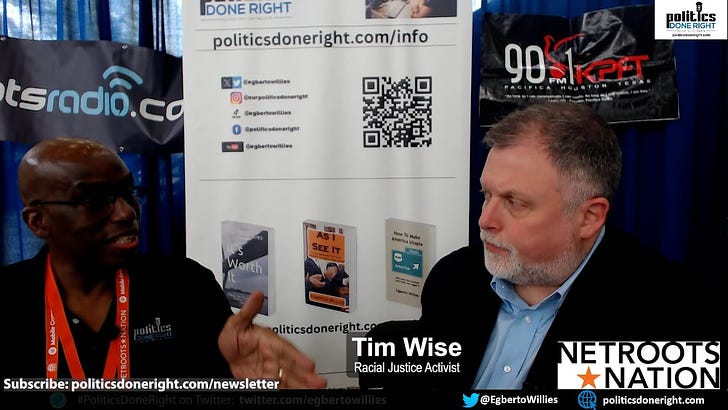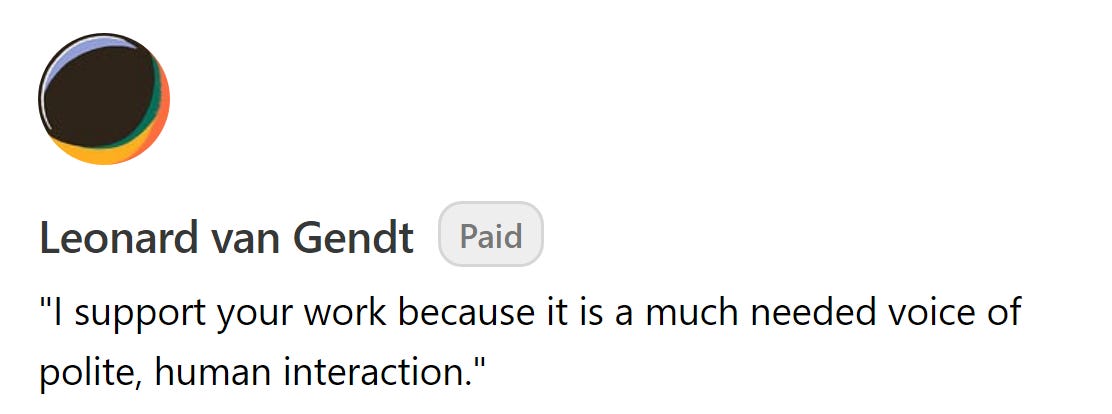Tim Wise discusses some very important race issues.
Tim Wise, a racial justice activist and warrior, visited my set at Netroots Nation 2024 to discuss the state of racism and racial justice and much more.
YOU CAN MAKE THE DIFFERENCE: This Project needs 20 new paid members today. Would you be willing to be one?
We are grateful for our Paid Subscribers and Free Subscribers. In this political climate, we need several hundred more Paid Subscribers. Misinformation funded by the deep pockets of our Oligarchy floods the internet. We are using all our platforms on-air, online, and in publications to counter that. We ask that you invest the equivalent of less than a coffee to ensure we can keep doing this effectively. Please invest in a Democracy that serves all of us by becoming a paid subscriber. It comes with many benefits.
Tim Wise speaks some uncomfortable truths.
In a compelling interview, Tim Wise—a prominent anti-racist educator and author—dives into the complexities of racism, white supremacy, and the moral imperative for reparations in the United States. Wise’s work spans decades, and his insights cut to the core of systemic racial injustice, white allyship, and the deep historical roots of inequality. The interview, hosted by Politics Done Right at Netroots Nation 2024 in Baltimore, revolves around the role of white people in dismantling systemic racism and the critical need for reparative justice, making it a crucial discussion for anyone invested in racial equity.
Tim Wise’s candidness about his position as a white man addressing racism highlights the discomfort many feel when confronted with issues of race. Wise notes that for many, especially white people, it is jarring to hear someone like him critique a system that has historically advantaged people of his race. In Wise’s words, “Whenever white men in particular spend 30 years of their life or 30 minutes of their life overtly challenging and speaking out against racism and white supremacy… it is something people aren’t used to.” This discomfort, however, is part of the process of deconstructing the entrenched privileges that racism has created, and it reflects the necessity of allyship from white individuals in combating white supremacy.
Wise’s critique of white allyship reveals that most white Americans are unaware of the long history of white participation in racial justice movements. Figures such as John Brown or Viola Liuzzo are seldom discussed outside of their martyrdom, but as Wise points out, “There are also a lot of white folks who did the work who didn’t die who continue to do the work.” This erasure from mainstream history creates an environment where contemporary white allies are seen with suspicion, both by white supremacists and even, to some extent, by people of color. The question remains, Wise explains, “What’s in it for him?”
The conversation then shifts to a key issue: reparations for African Americans. Wise is adamant that reparations are not only a moral imperative but a necessary component of addressing centuries of oppression. Wise’s analogy to corporate debt is particularly insightful. He argues that just as a CEO cannot dismiss the financial obligations of a company by saying, “Those weren’t my debts,” white Americans cannot absolve themselves of the responsibility to address the systemic inequities created by slavery and segregation. “We’ve inherited the legacy of that,” he notes, explaining that benefiting from the “assets” built by oppression without addressing the outstanding “debts” is a profound moral failure.
Wise calls for reparations to be systemic rather than individual, emphasizing that the injury caused by racism has been systemic. Wise contends that the fear many white Americans have—of having to pay a “Black people bill”—is misplaced. Reparations, as he envisions them, would involve the government and institutions that perpetuated racism paying the price, not individual white people. Wise draws parallels to historical programs like the New Deal and FHA loans, which disproportionately benefited white people while excluding Black and Brown Americans. He questions why a society that once supported programs for the uplift of white working-class Americans cannot now extend a similar systemic effort to correct the racial injustices of the past.
One of the more profound points Wise makes is the fact that reparations would benefit not only Black Americans but also working-class white people. Contrary to the rhetoric of conservative fearmongers, reparations would stimulate the economy, support Black-owned businesses, and improve education and healthcare systems that would, in turn, uplift poor and working-class communities of all races. Wise explains that white people who argue they haven’t directly benefited from slavery or segregation misunderstand the indirect advantages that the racial caste system created. These advantages, ranging from wealth accumulation to social standing, have reverberated through generations. As Wise argues, “Reparations aren’t taking something that white folks earned; it’s giving back what Black folks were unjustly denied.”
Wise also touches on the political dynamics of whiteness, using Bacon’s Rebellion as a historical lens. The rebellion, which saw poor white and Black indentured servants and slaves united against the wealthy elites in the 17th century, was a turning point in American race relations. The ruling class’s response was to invent and institutionalize whiteness, creating divisions between poor whites and Blacks to maintain control. This dynamic, Wise explains, persists today, as the ruling class uses the weapon of racial division to distract from economic injustice. Poor whites have been manipulated into defending a system that benefits the wealthy at their expense, all under the guise of racial solidarity.
Wise’s analysis extends to the contemporary moment, where politicians like Donald Trump stoke racial animosity as a means of maintaining the status quo. In the immigration debate, for example, Wise notes how Trump’s rhetoric targets both Black and white working-class people, falsely blaming immigrants for job losses. This divisive strategy echoes the tactics used by elites since Bacon’s Rebellion—keeping poor and working-class people of different races from uniting against the economic systems that oppress them all.
In this interview, Tim Wise analyzes race, reparations, and the ongoing struggle for racial justice. His call for systemic reparations and his nuanced understanding of how race and class intersect make it clear that dismantling white supremacy is not just a moral imperative for white people but a practical necessity for the survival of democracy. As Wise says, “If we have been left poor by the class system, we ought to be joining with Black folks to try to get reparations because those reparations are going to uplift the working class as a whole.” This conversation, while difficult for some, is one that needs to happen for any meaningful progress to occur in addressing America’s long history of racial injustice.
Viewers are encouraged to subscribe and join the conversation for more insightful commentary and to support progressive messages. Together, we can populate the internet with progressive messages that represent the true aspirations of most Americans.
Can we count on your help to reach our goal of 300 needed new paid subscriptions by the end of the month?
The other side has big donors and everyday citizens who invest heavily in platforms that lie and misinform. All we have is you. So, please invest in our media outlet by clicking the subscribe button below to become a paid subscriber. You won’t miss that coffee, but it will make a difference in our politics as we spread the truth about our policies and progressive politics. All paid subscribers get to read my five books on this platform and all subsequent books I write. They will also be privy to subsequent incentives.









You report: “...Reparations, as he envisions them, would involve the government and institutions that perpetuated racism paying the price, not individual white people.”
Wise argues for systemic reparations. Institutional. Presumably tax-supported. Consider: say I’m a Black person. I pay taxes, but part of my tax money is going to support systemic reparations to MY people? Make it make sense.
I think the issue can be resolved, somehow, but whew! Rising water lifts all boats, but still. There’s a lot to unwind.
Egberto, thanks for spotlighting Tim Wise’s views on reparations. I don’t necessarily agree 100%, but these are good insights.
Wise mentions Bacon’s Rebellion, in which “poor white and Black indentured servants and slaves united against the wealthy elites in the 17th century.” Unsaid, these folks took up arms because they wanted the Crown’s governor to drive indigenous peoples out of Virginia. The governor refused. In other words, these local British subjects — largely first and second generation immigrants — rebelled because the government would not commit genocide.
Tragic irony lies so thick, it morphs into black humor. I could envision a Monty Python skit.